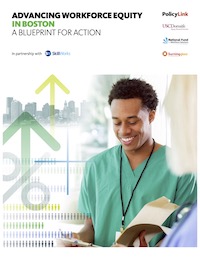In the Boston metropolitan area, as in the rest of the nation, deep racial inequities are built into the regional economy. People of color – especially Black and Latinx residents – face systemic and structural barriers to opportunity, and this impact is widespread. According to the data, White workers in Greater Boston with less than a high school diploma earn about the same as workers of color with an associate degree.
In fact, deeply entrenched racial inequity cost the region $44 billion in unrealized GDP in 2018 alone. Disparities in the system are felt by the whole region, but workers of color are bearing most of the burden.
This report, produced in partnership with PolicyLink, Burning Glass Technologies, and SkillWorks, provides a comprehensive analysis of long-standing racial gaps in labor market outcomes, the economic impacts of Covid-19, and the racial equity implications of automation.
The report concludes with a blueprint for action to advance workforce equity across the region, informed by the data and shaped by local leaders. Key recommendations include the following:
- Leverage the real estate development boom and industry growth to increase union participation and expand apprenticeship and secure public financing for social programs that support workers of color.
- Encourage public policy solutions that result in more good jobs and work across systems to expand investments in childcare, housing, and transportation — all with racial equity at the center.
- Encourage educational institutions and employers to transition to skills-based hiring.
- Invest in robust data collection and reporting systems to uncover inequities, track progress, and drive change.
You can find additional materials for this report at our partner PolicyLink’s website.

